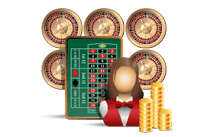Science and Seduction - The Devils Wheel
The Parisian game is traditionally associated with luxury, extravagance and a darkly mysterious history. Roulette’s shadowy tale of origin is interwoven with both mathematical genius and the occult, enhancing its legendary appeal. There has never been another game throughout history that has enticed such large crowds of tormented onlookers, frozen half in dread and half in wonder. A single spin of the wheel can spell out the destiny of the gambler, heaven or hell. It’s a theatrical display, but the stakes are real and performed on the stage of the gamblers own life. No wonder the game has such superstitious folklore surrounding it.
A Brief History of the Roulette Wheel
Through his attempt to defy the laws of the universe by inventing a perpetual motion machine in the 17th century, Blaise Pascal fathered a rudimentary model of the game that has we have to know as the “Devils Wheel”. While the mathematician’s attempt to create the impossible was doomed to fail, Pascal saw the wheel as an opportunity to experiment with probability. His original wheel had 36 numbers on it, without the additional zero The prodigy later went on to establish the theory of probability that we still use today, not only to win roulette, but in modern economics and scientific research.
Deal with the Devil
Legends claim that François Blanc, in his greed and lust for profit, sold his soul to the devil in order to claim the secrets of roulette for himself. Whether the man himself created the nefarious tale or whether it’s one that rose up organically is unknown. Soon after Blanc made his deal with the devil, the legend has it that roulette tables with additional zeros began to crop up in his casinos in Europe. Roulette became a huge commercial success. The additional zero is what gives the casino the house edge, guaranteeing them a profit through the very law of probability that Pascal discovered experimenting with the wheel. Is this the secret Blanc sold his soul for?
Perhaps this “Magician of Homburg”, a master performer used sleight of hand to distract the punters from his real intentions: increasing the house edge?
As a matter of fact, he did not. Blanc actually reduced the number of zeros from the single and double zero in common use at the time, to only one. This caused his casino to suffer some widely publicised, phenomenal losses during its early days. However, upon hearing this, wealthy gamblers flocked to this wonderful casino that favoured the player. Of course, as the odds are still marginally stacked in the casino’s favour at 2.26%, making enormous profits was only a matter of time with a wealthy clientele. Blanc went on to establish the iconic Monte Carlo Casino.
The Devil in the Detail
During 18th and 19th century and variations still in use today begin to develop more distinctly: European roulette with one additional zero, and American roulette with two additional zeros. These two versions remain the most widely played today. This goes to show that the mythology that captivated people’s imagination and darkest desires in 18th century Paris continues to do so today, around the globe.
However, one cannot deny that the numbers on the roulette board do add up to 666, the so-called number of the beast. This is most likely where and why the legend about François Blanc came about. The associations of “the little wheel” with the greatest Tempter of all time are certainly not accidental. Luckily, you won’t have to sell or gamble your soul to play roulette. The online casinos we list all accept cash, so you can enjoy your dance with the devil with your mind and soul in tact. Always remember to practice safe gambling.



